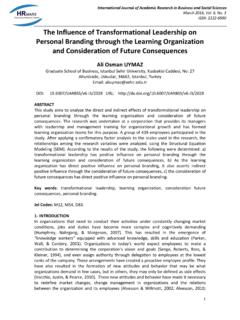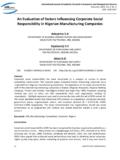Transcription of Achieving Sustainable Economic Development in Nigeria ...
1 International Journal of Academic Research in Business and Social Sciences February 2012, Vol. 2, No. 2. ISSN: 2222-6990. Achieving Sustainable Economic Development in Nigeria through Technical and Vocational Education and Training: The Missing Link Yusuff, Mulkat Ajibola Department of General Studies, Federal Polytechnic, Ilaro Soyemi, Jumoke Department of Computer Science, Federal Polytechnic, Ilaro ABSTRACT. In Nigeria , over the years, emphasis has been on general education, with vocational education at the receiving end. This has resulted in large number of educated people remaining unemployed. This phenomenon has now been recognized by the policy makers and hence there is a greater thrust on vocationalisation of education. Another shortcoming is the perception of TVET as a career path for the less academically endowed being fuelled by the low academic requirement into TVET programme, rather than an effective strategy to train skilled manpower for Economic Development .
2 This paper discusses the current environment in which TVET in the country operates and the effort government has taken to revitalize it as well as the lessons that can be learnt from countries that have achieved Sustainable Economic Development through TVET. The paper argues that for TVET to be a key to Sustainable Economic Development in the country, there is need for changes in public perception and image of TVET, rejuvenate the nation's moribound technical training colleges, instructors in training schools to leverage on industry partners to gather industry based experience and strict monitoring of industrial trainees. The paper concludes that technical and vocational education is a necessary but not sufficient condition for Sustainable Economic Development . What are required includes government policies that can stimulate the economy and adequate infrastructural facilities. Key words: TVET; Sustainable Economic Development .
3 Introduction Technical and Vocational Education and training (TVET) have been recognized the world over as tools for empowering people, especially the youth, for Sustainable livelihood and social- Economic Development . The United Nations Educational Scientific and Cultural Organization (UNESCO) and the International Labour Organization (ILO) recommendations of 2000 on technical and vocational education and training for the twenty-first century, defined TVET as those aspects of education process involving, in addition, to general education, the study of technologies and related sciences, and the acquisition of practical skills, attitudes, understanding and knowledge relating to occupations in various sectors of Economic and social life. TVET is further understood to be: An integral part of general education;. 71 International Journal of Academic Research in Business and Social Sciences February 2012, Vol. 2, No. 2. ISSN: 2222-6990.
4 A means of preparing for occupational fields and for effective participation in the world of work;. An aspect of lifelong learning and a preparation for responsible citizenship;. An instrument for promoting environmentally sound suitable Development A method of alleviating poverty The overriding goals of TVET in Nigeria are to: Provide trained manpower in the applied sciences, technology and business particularly at craft, advanced craft and technical levels;. Provide the technical knowledge and vocational skills necessary for agricultural, commercial and Economic Development ;. Give training and impart necessary skills to individual who shall be self reliant economically. The Development of technical and vocational skills is vital to Economic Development for two important reasons. First, technical and vocational skills are needed for enterprise productivity and profitability, as well as for national productivity and wealth creation.
5 Without the necessary technical skills, enterprise and national growth can be seriously hobbled. Technological innovation and Economic growth fuel the demand for skilled workers. The need for technical and vocational skills is increasing because of a convergence of factors technological change, changes in work organization, growing Economic openness and competitiveness, and capital deepening (increasing capital per worker). The second reason Development of technical and vocational skills is of vital importance is because it is essential for individual prosperity. Skills enable the individual to increase productivity and income. This is especially important for those who are seeking out a living in the informal sector of the economy. Today in Nigeria , population growth and urbanization; poverty and lack of income generating capacity and failure of graduates from schools system to secure employment clearly highlights the importance of career Development which is achievable through TVET.
6 To enable those still in post- secondary schools to be relevant to the world of work as well as to draw the majority of jobless people out of the unemployment market, there is need to reposition TVET as the best means to improve Economic opportunities for the teaming youths which will eventually enhance Economic Development of Nigeria . This paper sets out to examine if the revitalization of TVET as it is being currently done by the policy makers is adequate to achieve Economic Development so as to enable the country realize her goal of becoming one of the 20 economically developed economy in the world by year 2020. Current Status of TVET in Nigeria TVET varies from country to country and are delivered at different levels in different types of institutions: technical and vocational schools, polytechnics, enterprises and apprenticeship training centres. In Nigeria , the acquisition of formal technical education is possible from secondary to tertiary levels of the country's 6-3-3-4 education system.
7 At post-secondary/. tertiary levels, technical and vocational colleges, Polytechnics, Monotechnics and Universities, have been the institutional structures meant to enhance nation's technical growth. The duration of school based technical and vocational education is between three to five years, 72 International Journal of Academic Research in Business and Social Sciences February 2012, Vol. 2, No. 2. ISSN: 2222-6990. depending on institution and model. However, formal TVET in Nigeria are currently operating in environment that is characterized by: Low quality training: In general, the quality of training is low, with undue emphasis on theory and certification rather than skill acquisition and proficiency testing. Inadequate instructor training, inappropriate training equipments (demonstration equipments instead of actual equipments use in the industry), poor aspiration of incoming trainees, obnoxious policy of 80 percent success rate of trainees before accreditation of polytechnics and lack of instructional materials are some of the factors that combine to reduce the effectiveness of training in meeting the required knowledge and skill objectives.
8 Mismatch between training and labour market skill demand: This accounted for high incidence of unemployment among graduates from formal school system. The reason for this situation is lack of collaboration between the training institutions and industries. Poor perception of TVET: For many years technical and vocational education has been considered as a career path for the less academically endowed. This perception was fuelled by low qualification requirements for admission into TVET programmes (cutoff point of 160 for polytechnics in unified JAMB examination rather than 200 as obtainable for universities.) Also the view that polytechnics were set up to train the middle-level manpower that the nation needs for Economic Development make schooling at polytechnic secondary, after attempts to gain admission into universities have failed. Discrimination against graduates of technical schools: Constitutionally, the Universities and Polytechnics/Monotechnics in Nigeria are at par; they are all tertiary institution of learning.
9 The Bachelor of Science degree ( ) earned from Universities and Higher National Diploma (HND) earned from the Polytechnics are equivalents. Both and HND holders spend at least five years in school and undertake the National Youth Service Corps (NYSC); a compulsory one year service to the federal government of Nigeria . However, this parity does not go further than the aspects mentioned above. HND graduates for instance, are not admitted into a Masters of Science ( ) programme until they have acquired an additional post graduate qualification to their HND. Also, graduates of Polytechnics are not placed on the same salary level and step even in the Nigerian Federal and State civil services. The holder's salary is always higher. Furthermore, the HND holder is discriminated against by most professional bodies in their registration. Low enrollment at all levels of technical education: This situation stem from poor public perception of TVET and discrimination of graduates from technical schools.
10 Worse still is the stigma attached to artisans and craftstmen (those skilled in using their hands) which has led to the disappearance of trade schools and technical training colleges Weak monitoring and evaluation: Training institutions do not track the employment destination of their graduates. Consequently, valuable feedback from past trainees on the quality of training they have received and the opportunity of their experienced- based inputs to be factored into the review of curricula and training packages are lost. 73 International Journal of Academic Research in Business and Social Sciences February 2012, Vol. 2, No. 2. ISSN: 2222-6990. Inadequate financing: It must be recognized that TVET is expensive on a per student basis. Even though subvention to training institutions particularly polytechnics has been increased, it is still grossly inadequate because unit costs are necessarily higher in TVET institutions than in primary and secondary schools due to small student-to- teacher ratios, expensive training equipments and costly training materials that are wasted during practical lessons.


















